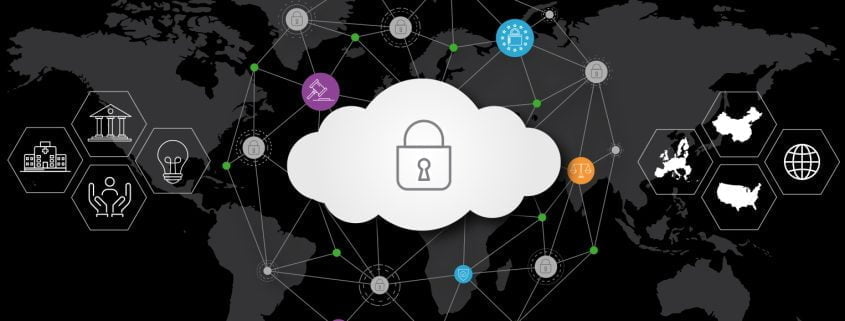Sovereign Cloud – An Integral Component of Multi-cloud Strategies
Enterprises globally are resorting to multi-cloud strategy to reap the benefits of improved flexibility, scalability, and efficiency coupled with enhanced performance and increased cost-reduction.
Statista Research indicates around 90% of large enterprises have already adopted multi-cloud. Furthermore, a survey shows the multi-cloud usage across industries from 2020 to 2023, indicating the insurance and telecommunications industry at the highest level.
That said, the growth of multi-cloud environments is accompanied by newer challenges, particularly those concerning privacy regulations and jurisdiction control.
Technology comes to the rescue—the Sovereign Cloud.
What is a Sovereign Cloud?
In simple terminology, Sovereign Cloud ensures that all the enterprise data remains on sovereign soil and prevents any data from being accessed by foreign entities under any circumstances. It offers a secure and trusted environment for the storage and processing of data, ensuring it never crosses borders.
The rationale behind the architecture of sovereign cloud is to deliver security and data access that complies with the stringent industry regulations and adheres to the local jurisdiction laws on privacy, security, and control.
Importance of Data Sovereignty
Of late, there’s been a growing concern across countries on data privacy and localization. Under this, nations like the European Union implemented the General Data Protection Regulation (GDPR), while others, including Australia and New Zealand, focused on enacting data localization regulations.
VMWare Research indicates that around 80% of global organizations use a combination of private, on-premise, and edge cloud environments. And 46% of organizations are expecting to add more cloud environments.
However, while organizations use multi-cloud for various reasons, they are equally concerned about data privacy and integrity in these environments. In a study conducted, 80% of respondents from the healthcare sector reported that multi-cloud use puts their sensitive patient data at risk.
These facts indicate the importance of data sovereignty across industry verticals, emphasizing the inclusion of sovereign cloud in an organization’s multi-cloud strategy.
Benefits of Sovereign Cloud
The sovereign cloud offers various cloud-native advantages to enterprises while adhering to the principles of data privacy, security, sovereignty, and other regulatory mandates.
- Crucial data, including metadata, is deployed on the cloud within the nation where the data was collected.
- Increased security aspects ensure adherence to specific frameworks and compliance procedures.
- Only certified staff with security clearance operate on the data
- Drives innovation in tandem with critical data using AI and ML technologies
- Reduced dependence on non-sovereign providers opens up their availability for other less critical data management tasks
- Data is subjected only to the regulations of the jurisdiction where it is collected
Role of Sovereign Cloud in a multi-cloud strategy
By incorporating and integrating sovereign cloud into their multi-cloud strategy, organizations can enhance their productivity and services while enjoying various benefits.
Let’s check it out.
- The platform for Innovation
With rapid digital transformation, economies across the globe, including Australia and New Zealand, are looking for opportunities to tap the potential of Sovereign Cloud. Regulatory authorities and policymakers are shifting their focus towards judiciously investing in data spaces. That said, Sovereign cloud ensures all data storage and management takes place within the purview of the data privacy, security, and compliance regulations.
- Localized services
In a limited cloud adoption scenario, sovereign cloud providers can help enterprises better to meet the data storage needs while remaining compliant with privacy standards. Besides, local cloud providers contribute to the growth of local communities and, thereby, a nation at the broader level.
VMware Cloud Provider Program partners offer local services on a geographical basis.
- Managing Complexity
All data is not the same. That implies the correct data must be deployed in the right cloud in case of a multi-cloud environment. Here, the sovereign cloud plays an integral role by enabling enterprises to innovatively manage critical data in a dynamic geopolitical landscape.
- Disaster Recovery Services
Users need a robust network to experience a hassle-free 24/7 availability of digital services. If a server goes down due to a cyberattack or a natural calamity, enterprises are confronted with the risk of their sovereign data, stored in a secondary location as a backup, being compromised.
However, with Disaster Recovery-as-a-Service (DRaaS) on the sovereign cloud, organizations can rest assured that all sensitive and critical data resides on a sovereign infrastructure, securing data integrity and ensuring business continuity.
Closing thoughts
In the era of digitalization, data privacy and integrity have increased significance. With enterprises migrating to multi-cloud infrastructure and countries mandating data protection, Sovereign cloud will gain more momentum soon.
About GDMS
GDMS is a Cloud Service Provider (CSP) specialized in sovereign cloud for developing markets. We currently operate in Laos and Myanmar and ambition to expand to Cambodia and Vietnam by the end of the year.
As a fully independent CSP, we leverage our wealth of experience in multi-cloud deployments and in-country multi-site facilities to address Clients’ needs for flexibility and integration with Global Hyperscaler’s.






